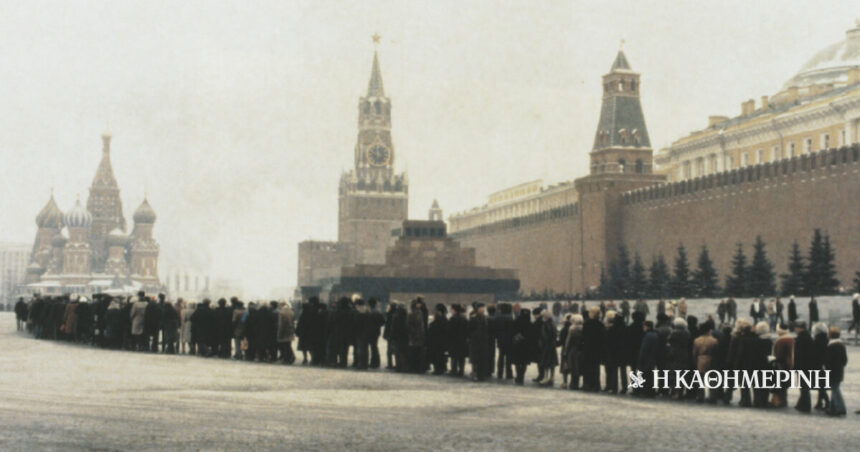Yuri Andropov, who chose to hide a lot of information about his ancestry, came, at least partially, from the Stavroupoli region to southern Russia. He loved the Caucasus mountain ranges where he was vacationing – reading books such as Montesquieu’s “Spirit of Laws” and Machiavelli’s “Ruler”. Rarely, she was baked “Saslikis” while listening to Soviet bars tunes, such as the melancholy Yuri Visbor and the satirical Vladimir Visotsky. Andropov and his wife Tatiana sometimes sang with trusted friends, people who will then describe him as patient and amazing.
Andropov himself has been considered an embodiment of the metastal system, determined to transform a dysfunctional economy, while at the same time willing to use extreme measures to maintain the system steady. He was in favor of signing Helsinki’s security and cooperation agreements in Europe. He noted, perhaps intuitively, that it would take at least fifteen years to make the results of the agreements in the Soviet Union to be noticeable. In the end, however, it functioned less as a member of an intelligent and much more as a brain of a Soviet version of the Holy Inquisition – a system of continuous repression and control.
A ‘hard’ of the system
As an ambassador to Hungary between 1954 and 1957, Andropov made every effort to learn Hungarian. However, it was also among those who urged Nikita Khrushchev to crush the country’s Prime Minister Imre Nagy when the latter announced the withdrawal of Hungary from the Warsaw Pact. In 1968, the Committee on State Security (Ms GKE Bee) of Andropov forged documents claiming that the US CIA headed for “Prague Spring” – and Andropov was among those who demanded Soviet intervention.
Andropov served less as a member of an intellectual and much more as a brain of a Soviet version of the Holy Inquisition – a system of continuous repression and control.
Almost at the top of the Soviet power, Andropov participated in the decision -making process that led to the mission of Soviet troops to Afghanistan. He knew the dangers. According to testimonies of that time, he had argued that “the use of troops would lead to war against the people (Afghanistan).” In the context of an ever -warmer warfare, Andropov took the risk. Ms GKE Bee was to assassinate Communist leader Hafizulah Amin – and Andropov himself would support a “limited” intervention.

Since 1967, Andropov has been the head of Ms GKE Bee. This meant that he was in the center of a panoptic, observing, struck and forwarded to crazy dissidents. At the same time, Andropov was watched by other officers of this system of power, which was partially based on fear. Since 1973 he was a full member of the Politburus, or a political office, of the main committee of the Soviet state policy.
Attempts to radical changes
From November 1982 to his death, in February 1984, Andropov was to serve at the top of the Soviet power, as head of the party that maintained the institutional unity between the Soviet democracies. Andropov had long been aware of the ineffectiveness of the system – with the economy increasingly dependent on exports of oil, which funded the appetites of the military -industrial complex. Andropov’s solutions included mobilizations against corruption, alcoholism and against professional inactivity.
His brief period of rule was also characterized by the Cold War revival – partly because of the shift of US policy. Andropov, of course, showed some understanding of the risk of nuclear confrontation. He called young Samantha Smith – a USA from the US – to the Soviet Union, even to emphasize that the Soviets “love their children”.

When Smith arrived, Andropov, already seriously ill, was unable to accept it. In addition, the image of Soviet power remained unchanged – old, slow -free leaders in vast rooms adorned with gold -plated chandeliers, who had a mark on each other’s breasts. But Andropov’s reform efforts had a significant benefit: they contributed to the notion that the problems faced by the Soviet system were structurally and linked to the lack of basic freedoms and the malfunctions of a directed economy. As one of the architects of Ms. GE Bee, an institution, who still throws his shadow into the post -Soviet space, Andropov at least ensured that this organization would not play a particular role in succession. Even more positive was his contribution to the emergence of younger members of the party. First among them another south, who had sung alongside Andropov that nights in the distant Caucasus. This politician – who undoubtedly believed in the ideals of the system – was called Michael Gorbachev.
Soviet rock, young people sing the end of the regime
He may have enjoyed the bard of his time, but Yuri Andropov’s preferences did not extend to the emerging scene of the Soviet rock. Short waves of the 1970s and 80s were capturing bands such as the Rolling Stones, but broadcasts were blocked by the authorities. Domestic Soviet bands, many of which came from Leningrad, created other kinds of challenges. The acne of the Soviet rock coincides with the era Andropov and Chernienco.
Adrophopov’s governance contributed to the perception that the problems of the Soviet system were structurally and linked to the lack of basic freedoms and the malfunctions of a directed economy.
In fact, the 1980s Soviet rock was developed by a combination of western influences and Russian traditions. Burns such as Boris Grebensikov’s Aquarium (known as EIA GKE) did not belong to any organized opposition, but operated in a universe parallel to the official Soviet reality. The members of the bands were working during the day and met in the basements of the city, in their apartments and in their courtyards, as soon as the lights were lowered.
This hidden music was able to approach a mass audience due to the drastic increase in the number of cassettes produced by the Soviet Union, brands such as Romantic 304, which gave their owners bunch. “Magnizdat”, a derivative of “Samizdat” – a combination of Russian words for “cassette player” and “edition” – describes the distribution process – informal recordings could now compete with the state monopoly of “melodia”, which in most cases followed. Consequently, the state resigned from the monopoly on acoustic production.
Social contradictions
Rockets paid special attention to the lyrics of their spins: ‘I sit and look at a foreign sky / and I don’t see a familiar star […] But with a Paco cigarettes in his pocket, not everything went. ” In the tense, monotonous voice of Russian -shaped Victor Choi, the song looks more like a spell or even a prayer. Many rock bands dealt with religious themes, for example the song “Church without Crosses” by Yuri Sevzuk (of the DDT band): “It is dark in my soul / betrayal tattoos / glass broken / torn walls / tomorrow I will die.” The bands had their own style – punk elements included deliberate sloppiness and incomprehensible joint, attributing their music a sense of roughness.

If Leningrad’s youth were going forward, the young other cities were coming. The bomber complex of the Sector Gaza (a punch between Gaza Strip in Palestine and the Gas Sector, in other words an area of industrial contamination) came from Boronez. Zana Aguzarova from Siberia became the first woman to shine in this aggressively masculine environment. Bands such as Western Ukraine Embi experimented with the integration of Ukrainian organs into their future rock.
Soviet youth organizations such as Komsomol, who had attempted to take possession of various youth cultures starting with jazz in the 1950s, have now tried to distract rock the dynamism for the benefit of the system. Greens from the Baltic Republics, Georgia and Russia participated in the first official rock festival of the Soviet Union that took place in Tbilisi in 1980. Another festival was held in 1983 at the Rock Leningrad Club. As Misel Abesher, one of the leading experts for the Soviet music scene, points out: “Cultural geography is important! From the beginning of the Cold War, which forced the country to openly open to the outside world to compete in the West, the Baltic countries, Western Ukraine and the Republic of the Caucasus became breeding places for the appropriation and transformation of different jazz and rock style. Often these non -Russian regions became the real places of cultural innovation. “
The songs proved more strongly than bureaucrats and police officers.
However, Andropov and Chernienco and the Senior Authorities of the Soviet Union did not hide their disapproval. Such music remained for them “harmful – aesthetically and ideologically”. Rock did not inspire any kind of patriotism and did not mobilize youth to the ideals of the Soviet Union. The songs, however, proved to be more vigorously than bureaucrats and police officers. The rock of Leningrad’s youth served as a quasi -dancing dance of an ancient tragedy – witness and catalyst for the fall of the Soviet system.
*Mr. Yiannis Karras is an Associate Professor at the University of Macedonia.
*Curated by: Evanthis Hatzivasiliou.




